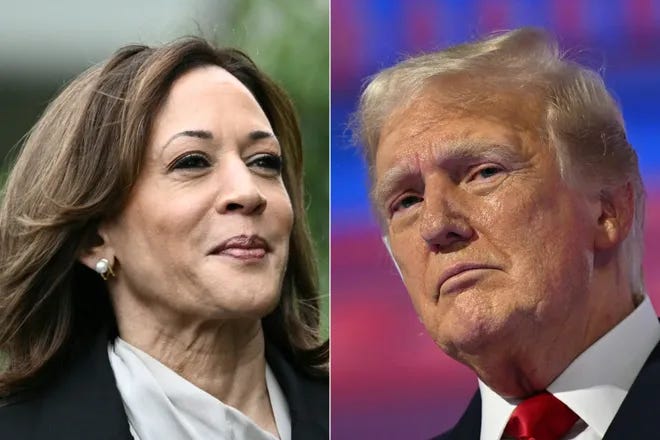Trump's Decision to Decline Second Debate; Celebrity Political Endorsements
And, confused or upset your message isn't being understood? There's something to know that can really help.

Are Donald Trump and his campaign doing the right thing in declining a second debate with Vice President and Democratic nominee for President, Kamala Harris?
Competitors compete. In what is a very unknown outcome — the election — should Trump be bypassing the opportunity to communicate in a debate setting and compete against the opposition?
It seems high risk and a decision that could come back to haunt him. There have been critics that say that Harris, not known as a sophisticated and skilled speaker, may have been provided questions ahead of time. There is also the possibility that she and her team prepared diligently for the first debate and Trump did not. That’s plausible.
Trump’s public statement for not “RSVP’ing” for a second round with Harris:
"It's just too late - voting has already started," he said. Trump also said he's "already done two" debates and questioned whether CNN would be fair to him.
Maybe he can succeed without competing yet if Harris is not known as a high-level communicator when it comes to answering questions, Trump might be making a critical error in his campaign by appearing uneasy, afraid or disinterested.
There is an analyst however who believes that Trump’s decision is protectively wise.
“Harris won the first debate, and as an attorney and prosecutor, she is trained to think on her feet in an argument so she would likely win any subsequent debate as well,” contends William S. Bike, a historical-and-political commentator and the author of the book, “Winning Political Campaigns.”
His conclusion about former president’s decision aligns with that reality.
“It is politically strategic of Trump not to debate again,” Bike asserts.
“If he did and Harris beats him again, he takes the chance of not only some undecided voters going to Harris but even some Republican voters getting disenchanted and doubting his acumen. They won't go over to Harris, but they might stay home.”
That is not proper risk response, Bike advises.
“He shouldn't take that chance. If a debate or any action as part of a campaign doesn't serve you well, don't do it,” he says.
There is sobering evidence to prove his point.
“History shows that losing a debate can swing an election. In 1976 in a debate against Democrat Jimmy Carter, President Gerald Ford said there was no Soviet domination of Eastern Europe,” Bike teaches. “There had been Soviet domination of Eastern Europe for 30 years at that point, and all Americans knew it.
“Ford's fumble in the debate was a major factor in him losing a close election.”
Ford wasn’t alone in hurting himself.
“Four years later, in a debate against presidential candidate Ronald Reagan, Carter fumbled the question about the Iranian hostage crisis, a question everyone knew was coming, that he should have prepared for and his staff should have drilled him on,” Bike recalls.
“Carter was actually in the lead in the polls that October of 1980, but after that debate, undecideds broke an unprecedented 16-to-1 for Reagan. The debate had cost Carter the election.”
The risks sometimes can far exceed the beneficial possibilities.
“It's much easier to lose a debate than to win one,” Bike says. “And the consequences of losing one are much more devastating than the advantages of winning one.”
He points to history again.
“Richard Nixon, after losing his debates against JFK in the 1960 presidential race, simply refused to debate his Democratic opponents in 1968 and 1972,” Bike says.
“That refusal didn't hurt him, as he won both elections.”
Do you know the name, Benito Antonio Martínez Ocasio? He is the Puerto Rican recording artist known as Bad Bunny and some Democratic political experts believe that he could be a key driver of extremely valuable Latino votes for Kamala Harris.
Here’s why that is interesting:
The potential persuasive power that Martínez Ocasio offers — Kristian Ramos, a Democratic consultant told the Washington Post — is big.
“That would be like a Thanos-level event,” Ramos said, referring to the well-known Marvel Universe character. “That’s a ‘game-over’ moment.”
Jesus Rodriguez and Sabrina Rodriguez of the Post detail why.
“Pennsylvania, perhaps the most important swing state (where many pollsters see a dead heat between Harris and Donald Trump), is home to the third-largest population of Puerto Ricans outside the island — including roughly 300,000 eligible voters,” they write.
“Bad Bunny would give them that green light, right?” says Victor Martinez, a radio host and owner of five Pennsylvania stations. “That sense of, ‘Okay, if he’s for her, then it’s okay for me to be for her as well.’”
Not everyone believes that this would be a difference-making strategy.
“Luis A. Miranda Jr., chairman of the board at Latino Victory Fund, said that the Harris campaign’s energy would be best spent on get-out-the-vote efforts that involve knocking on doors, digital advertising and community support,” Rodriguez and Rodriguez write.
“That’s how you win an election,” Miranda said. “Celebrities get you a lot of earned media, and you raise money; they don’t win elections.”
“Communication is about what is received, not what is intended,” writes James Clear.
“If there is a gap between what you are saying and what they are hearing, you have to find a new way to say it.”
I’ve witnessed people, even in my own family and friendship group, become increasingly frustrated — and at times, angry — in efforts to get an important point across because the recipient of their communication is genuinely confused.
The recipient honestly wants to understand yet the words and meaning being communicated are not landing as clearly as the person talking (or in some cases, writing) believes.
Their frustration, while understandable, is misplaced. It’s, as Clear writes, the duty of the speaker (or writer) to take a breath, stay poised and communicate in a different manner that is more effective.
Of course, this is entirely different than a recipient (listener or reader) playing dumb or gaslighting. That happens too. Yet it isn’t the norm in most social interactions. It’s instead about learning where the communicating is not conveying what helps create clarity and understanding.






